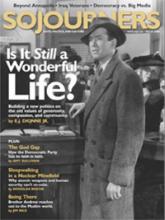The transition of today’s churches from modernism to postmodernism dominates many discussions in Christian and secular media. While mainline denominations are experiencing dwindling memberships, evangelicals are witnessing explosive growth. But even within mega-churches that court thousands of members, some evangelicals point to a growing malaise among their members.
The novel Chasing Francis: A Pilgrim’s Tale, by Ian Morgan Cron, addresses this post-evangelical dilemma. What happens when the truth, typically defined as the Bible’s black-and-white answers to all moral questions, begins to take on shades of gray? And what about the paradox of taking the Bible literally but driving fancy SUVs, shopping upscale stores, and supporting war and violence to achieve certain ends? Morgan Cron explores these questions through the life of St. Francis, who lived in a time of extreme wealth for the few, rampant church corruption, and the Crusades.
Morgan Cron’s story begins with the main character, Chase Falson, doubting his deeply held evangelical beliefs. His life becomes meaningless as his pre-programmed idea of “Truth” begins to shatter. This type of crisis is serious for any Christian, but it’s especially troublesome for Falson, who is head pastor of an evangelical mega-church in New England.
Falson finds himself in Assisi on a forced leave of absence while visiting his uncle, a semi-retired Franciscan priest and spiritual director. Uncle Kenny suggests a pilgrimage in the footsteps of St. Francis, promising that the physical pilgrimage will mitigate Chase’s internal struggles by showing him the way of St. Francis. Kenny gives Chase a journal to document his internal pilgrimage.
Read the Full Article
